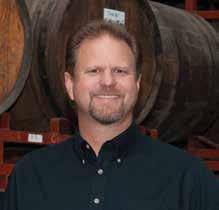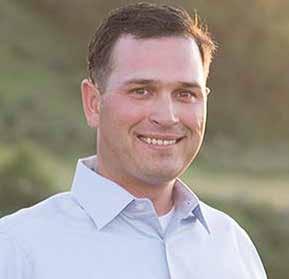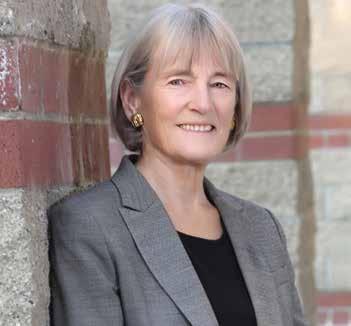
13 minute read
Leadership During Crisis: Wine Industry Alumni Perspectives
Leadership During Crisis
Wine Industry Alumni Provide PERspectiveS on Challenging Year
BY LIZA TEIXEIRA ROBERTSON

Jeff Bitter (32) President Allied Grape Growers Wine Grape Grower Madera
How has COVID-19 affected your organization? Shutdowns caused an overnight shift in how and where consumers accessed wine. While initial 2020 wine shipment data points toward no real change in the amount of wine people are drinking, the shift is actually in dollar value. Much more wine is being purchased for “off-premise” consumption, which is generally much lower priced than wines purchased for consumption on-premise.
What have you done to adapt your organization? We have changed our marketing emphasis to respond to the rapidly changing demands. Part of that is positioning and strategy with regard to grape supply, and part of that is education of our growers and the industry with regard to market dynamics. If we were to have had “all our eggs in one basket,” the effects of the government response to the pandemic could have been devastating on us.
How did smoke-exposed grapes resulting from the 2020 wildfires impact your business? Allied Grape Growers missed out on millions of dollars in potential grape sales revenue as a result of rejections and refusals by grape buyers. While some of our growers may be eligible for insurance and/or disaster assistance, our company does not receive any portion of such benefits. Overall revenues will be down for the year due to these situations, and our response will be to perform budget cuts to address the unanticipated revenue reduction. What did you do to respond to these industry challenges? Short term, we increased our communications and contract negotiations to work through the issues with growers and grape buyers. Many wineries are struggling to maintain sales and profitability. Partnering with them with regard to pricing and terms, to help see them through, has been of paramount importance. Longer term, we initiated efforts to address smoke exposure issues within the industry. Allied Grape Growers was very successful in taking advantage of market opportunities to help offset losses.
How do you use what you learned in Ag Leadership? Change is inevitable; it’s important to always be ready for it and even embrace it. Diplomacy is a major quality that Ag Leadership helped me to develop personally. Confrontation arises much easier during challenging times; diplomacy is essential to defuse confrontation.
What advice do you have for fellow alumni who find themselves in leadership roles during times of crisis? Take things one day at a time. Don’t get overwhelmed by the totality of the situation; address problems and process solutions one at a time.

Jim Stollberg (35) Maverick and Hampton Farming Companies Santa Maria
How has COVID-19 affected your business? Protecting our employees is always our No. 1 priority, but it took on an additional focus this year. Not only the physical protocols we have trained for and implemented, but staying up-to-date on the ever-changing regulations.
What have you done to adapt your business? The wine grape business was in oversupply prior to COVID-19, so in many ways we approached the year with low revenue expectations. Tight cost controls and strategic spending decisions have been important all year. We made employee shift changes to limit interactions, made adjustments to increase distancing and minimized common touch areas.
How did smoke-exposed grapes resulting from the 2020 wildfires impact your business? We had a number of contracts cancelled due to real or potential smoke impacts. A few were replaced with lower priced contracts and some fruit was simply not harvested. Ultimately, I feel the unharvested tonnage across California this season may benefit us in the near-term by beginning to balance the oversupply situation.
What did you do to manage these industry challenges? My conversations with other growers, current grape buyers and potential secondary buyers went on hyper-speed as we all tried to get our fruit a home. We literally had two to three weeks to get it figured out before the fruit was overripe and unharvestable.
How do you use what you learned in Ag Leadership? Preparation was a saving attribute this season. Our team was prepared for the planned events this farming season and that allowed the additionally needed time to be available for the COVID-19 workload increase and harvest smoke impacts. Rarely is good preparation superfluous, but this year it paid dividends for our farms and clients.
What advice do you have for fellow alumni who find themselves in leadership roles during times of crisis? Many times leadership roles come on unexpectedly and sometimes we don’t even realize it is a leadership opportunity until it has passed. Be prepared in your personal, professional and social lives as much as possible. This year was difficult dealing with family challenges, kid’s schooling and work issues. A deep breath and a day-ending glass of wine can do wonders!

Nicholas Miller (36) Vice President of Sales and Marketing Miller Family Wine Company Santa Barbara
How has COVID-19 affected your business? We are all hyper-aware of the pain and downside that COVID-19 brought to our industry. However, one of the greatest upsides has been the alignment within our organization. The collaboration across functions and departments has been incredible. What have you done to adapt your business? We have put our employees first, making sure the safety of each member of our team is respected.
How did smoke-exposed grapes resulting from the 2020 wildfires impact your business? While we were very fortunate that our wine grapes were not directly affected, it still created a lot of uncertainty during harvest as many of our winery customers were nervous about all grapes. The biggest concern is that the 2020 vintage gets written off entirely due to smoke damage within specific regions.
What did you do to respond to these industry challenges? Recognizing early on that the world wasn’t going to return to what it was in February, we quickly shifted sales strategies to where we saw the industry was heading. We focused our efforts on direct to consumer (DTC) sales and off-premise retail chains. In DTC, we launched a new subscription based wine club solely online called The Punchdown Club by the Miller Family Wine Company.
How do you use what you learned in Ag Leadership? Two of the greatest lessons from Ag Leadership I used this year were: 1) Remain centered in your life. Crisis happens and you respond, but remain centered, and 2) Every business is dying unless it is reinvented. The ostrich head in the sand strategy in March and April “waiting for the other side of COVID” was not an option.
What advice do you have for fellow alumni who find themselves in leadership roles during times of crisis? Lean on your team. Spend more time in meetings, not less. Check in with face-to-face or video calls with more frequency than you think is necessary. Over communicate; your team wants to know there is a vision and goal. There is opportunity, look for it.

Mike Testa (42) Board Chair, California Association of Winegrape Growers Partner, Coastal Vineyard Care Santa Maria
How has COVID-19 affected your business? As an industry, we innovated to do the same amount of work with less people. We had to keep our crews small and only focus on critical tasks for the health of the vineyard. When we felt like we had good protocols in place and wanted to staff up again, we couldn’t get the labor. The unemployment incentive really hurt us.
What have you done to adapt your business? We did three to four times more mechanization in our company than before. We got the work done and we got the grapes picked. Who I sell my product to has also changed drastically. I have pivoted
myself to wineries that are making themselves successful via online sales and grocery delivery.
How did smoke-exposed grapes resulting from the 2020 wildfires impact your business? We didn’t have any fires, but we had smoke and haze in the area. So that created a lot of concern. We still went through the testing protocols and were at the mercy of the wineries. We did have some reject our grapes, so we changed how we’re looking at contracts for 2021 to mitigate our risk.
How do you use what you learned in Ag Leadership? I had dozens of crucial conversations and tried to make sure to keep emotions under control to keep long-term relationships in mind. It was imperative for me to exercise my emotional intelligence to recognize how I can support my employees, keeping their well-being and safety paramount in this uncharted and stressful environment.
What advice do you have for fellow alumni who find themselves in leadership roles during times of crisis? Regularly dialogue with colleagues and business owners to make sure collaboratively you are making the best decisions for your industries and communities. Ag Leadership really taught me how valuable getting feedback from peers can be when you’re trying to navigate through a crisis. We are stronger united, certainly. What advice do you have for fellow alumni who find themselves in leadership roles during times of crisis? Surround yourself with other leaders, fellow classmates or mentors who can serve as a sounding board during difficult times. Reflect on the experiences and skills Ag Leadership provided to solve the most difficult challenges. Do not be afraid to experiment with solutions by creating a “safe to fail” environment.

Justin Perino (44) General Manager Finished Goods Operations Scheid Vineyards Monterey
How has COVID-19 affected your business? With the initial shutdown, we allowed only essential personnel to work on-site. For our sales team, it presented the greatest challenge due to the inability to meet with distributors and buyers in person. However, we discovered that buyers working from home are more relaxed and receptive. This created an opportunity to share our story and products; under normal conditions, that may not have occurred. Our restaurant and travel wine sales have been decimated, but the increase in retail sales has more than offset these losses.
What have you done to adapt your business? We analyzed each department for risk levels of COVID transmission. We adjusted to accommodate social distancing, mask adoption and sanitation regimens. We implemented a split shift in our bottling operations to reduce total headcount. We conduct daily COVID briefings before each shift and use a questionnaire that allows us to contact trace and tabulate any potential exposure risks. How did smoke-exposed grapes resulting from the 2020 wildfires impact your business? Several of our vineyards were in proximity to both the River Fire and Dolan Fire, which created significant smoke across our farm. As a result, we began testing our grapes across all vineyards. We continue to monitor our wines and have tools at our disposal to address any smoke taint issues that may arise as wines mature. One positive impact was the surge in demand for bulk wines, which helped deplete inventories and stabilize, and in some cases increase pricing.
How do you use what you learned during Ag Leadership? With any challenge, it requires self-awareness, deployment of sound reasoning, problem-solving skills and clear communication; all attributes I gained or refined while in Ag Leadership. I have often reflected on something Dr. Thomas told us: “pack your flexibility.” Skills developed through Ag Leadership helped me work with others who struggle with rapid change, helping them to adapt and remain productive.

Yvonne Sams (45) Senior Director of California Logistics G3 Enterprises
How has COVID-19 affected your business? Our team continued to come into the office, but started wearing masks, social distancing, limiting the number of people who were in our workspace and meeting outside. We brought in portable buildings to give people enough space to work safely.
What have you done to adapt your business? We have done a lot more virtual meetings and trainings and figured out that you can do some work from home. We learned that you can wear masks at work and work comfortably. We have increased our cleaning procedures and started using less paper and integrated more automation.
How did smoke-exposed grapes resulting from the 2020 wildfires impact your business? There were wildfires in every wine region and we haul grapes in every region. As a result of the fires, there was a smoke layer that slowed the growth of the grapes and reduced outside temperatures. We transport
45% of the wine grapes in California, so this was a big deal because we were ready, the wineries were ready, but the grapes weren’t ready; harvest decisions were changing from one moment to the next.
What did you do to manage these industry challenges? We worked to identify areas that needed more support and worked together as a team to communicate with customers almost daily so that we could try to anticipate and adjust our resources.
How do you use what you learned in Ag Leadership? Through feedback that I was given as part of Ag Leadership’s executive coaching, there are things that I know I need to focus on as an individual. I made sure I was aware of those areas in a way that provided a calm and structured environment—focusing on staying agile and flexible and leading the team through the craziest harvest we’ve ever had without creating a lot of chaos. Ag Leadership gave me the perspective and selfawareness I needed to become a stronger leader.
What advice do you have for fellow alumni who find themselves in leadership roles during times of crisis? I would say listen, act with intention and have a plan. It really is about leaning on the Ag Leadership principles. Our weaknesses can come out in a crisis, but it’s also an opportunity to lean on your strengths. Take the lessons you learned and apply them during difficult times.

Taylor Serres (49) Serres Ranch Sonoma
How has COVID-19 affected your business? We are very fortunate in the sense that we have employees that live on our property year-round, so we were able to continue to work together since we have a smaller crew. Thankfully, agriculture is considered essential, so we were able to carry on farming with all our normal practices. In regards to the selling of wine, it was definitely more difficult. Due to the increased use of personal shoppers, there were a lot fewer impulse purchases being made.
What have you done to adapt your business? We really haven’t, other than for the sales side. I would say we’re doing more promotions and we did a closeout sale to help reduce inventory. We made sure we supplied the basic personal protective equipment to ensure the health of our employes. All our sanitization steps are the same, above what’s required from the state, so we just didn’t change that much due to COVID. How did smoke-exposed grapes resulting from the 2020 wildfires impact your business? The Glass Fire did have an impact on our grapes. We had two wineries reject fruit. We are in negotiations with three wineries who accepted and processed the fruit, but we won’t get paid until there’s a clean test. That’s a really hard one since we have already incurred the farming and harvesting costs.

What did you do to respond to these industry challenges? We just rolled with the punches. The beauty of farming is that it’s a very resilient industry and you just figure it out. It’s not always the best option, but that’s just what has to be done.
How do you use what you learned in Ag Leadership? Not being super reactive and really thinking about the bigger picture and taking a step back. Just having patience and realizing that with hard work, you may not end up on top, but hopefully it doesn’t take a huge toll.
What advice do you have for fellow alumni who find themselves in leadership roles during times of crisis? Think about the big picture. It may not be a situation where you’re going to be the one on top, but if the entire industry is going to succeed, then that’s a win. Have patience and stand up for what you believe in.









